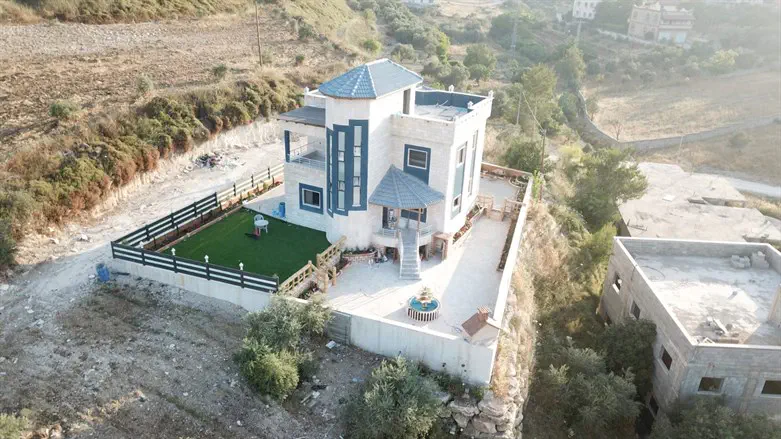
Last week, a new petition was submitted to the Jerusalem District Court demanding the issuance and implementation of stop-work orders, demolition orders and other administrative measures, against a luxurious new three-story villa, complete with a swimming pool in the expansive yard, which was built without a permit and in blatant violation of the law near the village of Funduq, on land in Area C under full Israeli jurisdiction.
The villa was built on the route of the Funduq bypass road, a new thoroughfare planned by the Netivei Yisrael Corporation (the Israel Roadworks company) at a cost of hundreds of thousands of shekels, to ease traffic congestion in the area and improve road safety and security for all residents of the area – Jews and Arabs alike.
The illegal mansion is obstructing its path, thwarting development and deepening the traffic chaos in the region from which all residents must continue to suffer.
A year ago, in the summer of 2021, when construction of the massive villa was in progress, the Samaria Council and the Regavim Movement appealed to the authorities, demanding that the law be enforced immediately, but only three months later the Civil Administration replied that "if necessary, supervision and enforcement procedures will be taken in accordance with established procedures, in accordance with enforcement priorities, and subject to operational considerations "
When months passed and no enforcement was carried out - and the construction of the villa continued at an accelerated pace - Regavim again turned to the Civil Administration to urge enforcement of the law; the Civil Administration’s response: "A work-stop order will be issued as soon as possible." In other words – no such order had been issued. At this point, the Samaria Council and Regavim decided to petition the court.
The new lawsuit raises the issue of "enforcement priorities" which, according to Regavim, the Civil Administration uses to hide its massive failure to enforce the law against illegal Arab construction in Area C.
In an appendix to the petition, Regavim lists dozens of cases in which the court accepted the Civil Administration’s fig-leaf claim of “enforcement priorities” based on system overload and insufficient manpower.
The court has maintained a policy of non-interference in “professional considerations,” but in practice, according to the petition, under the auspices of this claim, the Civil Administration completely avoids enforcing the law.
Moreover, Regavim’s petition contends that if the Funduq case, which involves illegal construction on a major traffic artery – constituting a high priority for enforcement - receives no attention whatsoever for more than a year, the Civil Administration’s priorities for enforcement are nothing more than a hollow excuse for inaction.
Yossi Dagan, Head of the Samaria Regional Council: "This is absurd. The state plans to invest millions of shekels to double the capacity of the road in order to provide a safety and security solution for thousands of Israelis and Palestinians, but on the other hand it does not enforce the law and does not maintain the area."
"It is inconceivable that while we see vigilant enforcement activity against Jewish pioneers in the young Jewish settlements, absolutely nothing is being done to fight the takeover of our national lands. Sadly, the law has not been enforced against a massive structure that was built for the purpose of a deliberate takeover and is preventing the construction of the road. We hope that this petition to the Court of Appeals will result in the demolition of the illegal construction and the preservation of the nation's lands in the area."
Adv. Boaz Arzi, Legal Counsel for the Regavim Movement said: "From our experience with the Civil Administration in hundreds of similar cases, when we receive a response with a claim of enforcement priorities, it means the Civil Administration has no intention of enforcing the law."
"By turning a blind eye to a huge, luxurious villa that is blocking the construction of a road that was planned at tremendous expense to the public, the Civil Administration indicates questionable judgment, to put it mildly, and proves once again that the Civil Administration's claim that it is acting according to “priorities” is simply untrue. The Civil Administration repeatedly abuses the court’s trust and no less seriously, the trust of the public."
